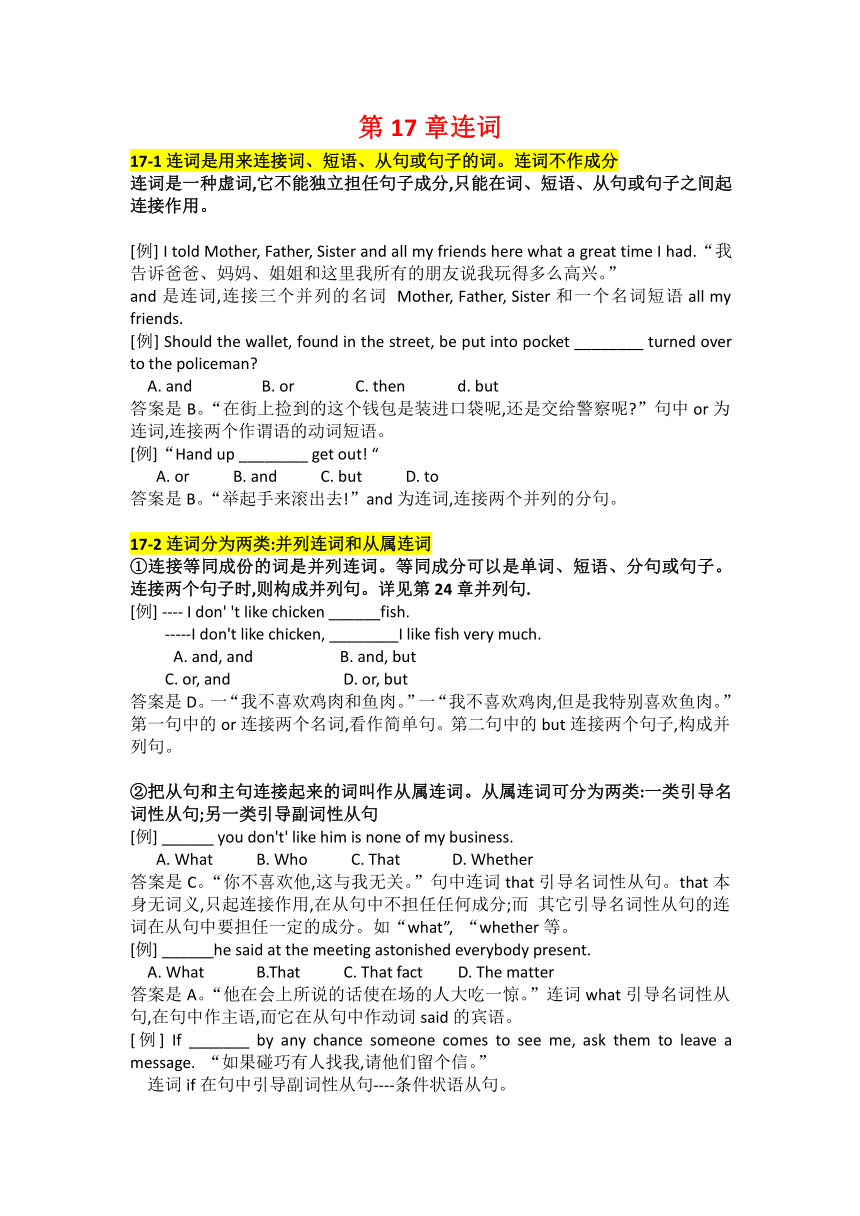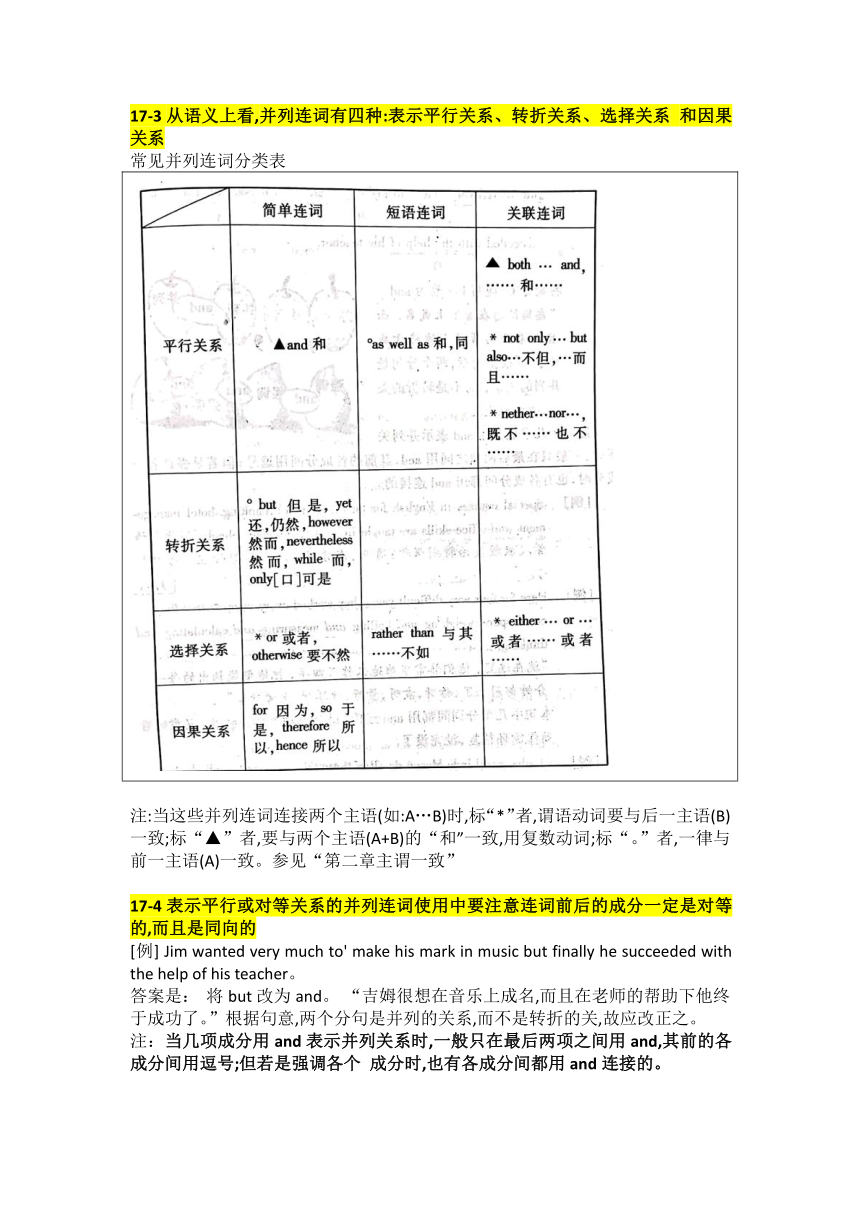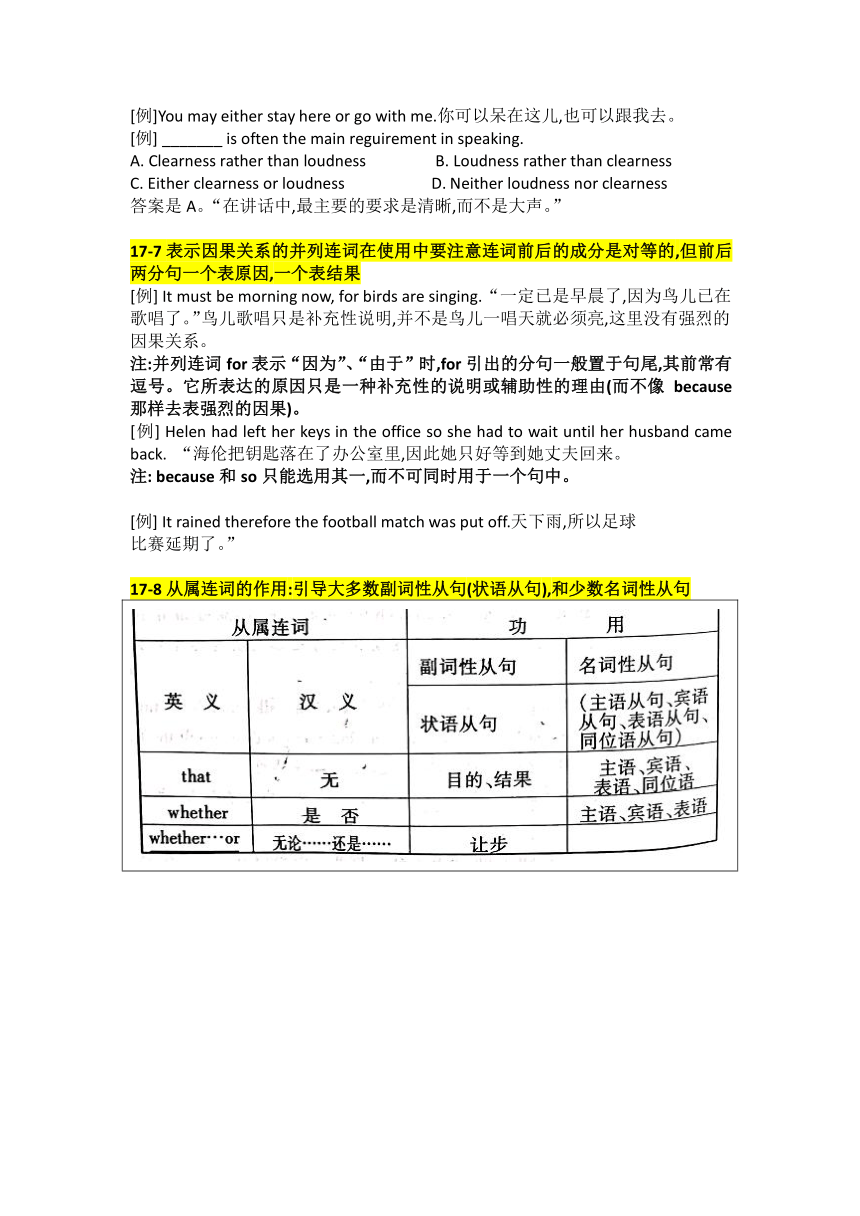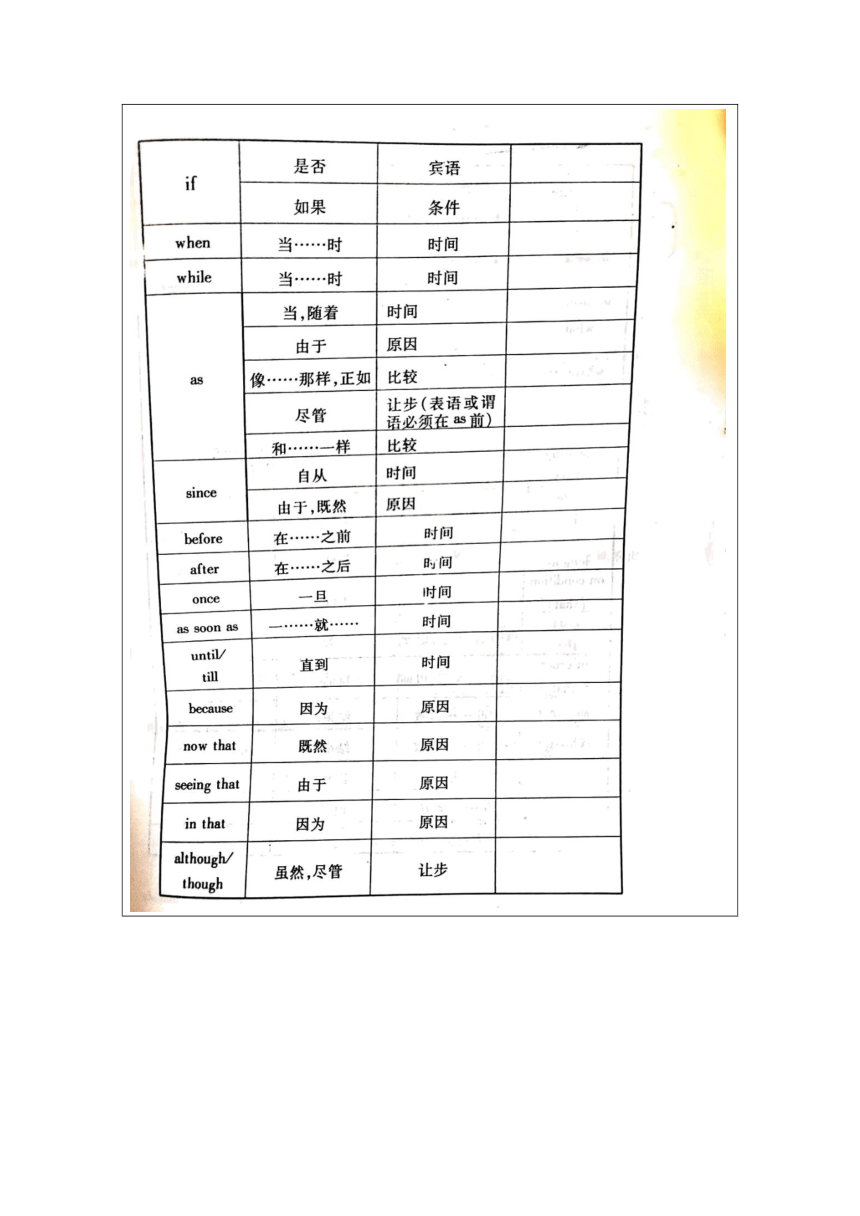连词(英语语法第17章)讲义(含答案)-2025届高三英语二轮复习专项
文档属性
| 名称 | 连词(英语语法第17章)讲义(含答案)-2025届高三英语二轮复习专项 |

|
|
| 格式 | docx | ||
| 文件大小 | 2.0MB | ||
| 资源类型 | 教案 | ||
| 版本资源 | 人教版(2019) | ||
| 科目 | 英语 | ||
| 更新时间 | 2025-01-09 17:17:05 | ||
图片预览





文档简介
第17章连词
17-1连词是用来连接词、短语、从句或句子的词。连词不作成分
连词是一种虚词,它不能独立担任句子成分,只能在词、短语、从句或句子之间起连接作用。
[例] I told Mother, Father, Sister and all my friends here what a great time I had.“我告诉爸爸、妈妈、姐姐和这里我所有的朋友说我玩得多么高兴。”
and是连词,连接三个并列的名词 Mother, Father, Sister和一个名词短语all my friends.
[例] Should the wallet, found in the street, be put into pocket ________ turned over to the policeman
A. and B. or C. then d. but
答案是B。“在街上捡到的这个钱包是装进口袋呢,还是交给警察呢 ”句中or为连词,连接两个作谓语的动词短语。
[例]“Hand up ________ get out! “
A. or B. and C. but D. to
答案是B。“举起手来滚出去!”and为连词,连接两个并列的分句。
17-2连词分为两类:并列连词和从属连词
①连接等同成份的词是并列连词。等同成分可以是单词、短语、分句或句子。连接两个句子时,则构成并列句。详见第24章并列句.
[例] ---- I don' 't like chicken ______fish.
-----I don't like chicken, ________I like fish very much.
A. and, and B. and, but
C. or, and D. or, but
答案是D。一“我不喜欢鸡肉和鱼肉。”一“我不喜欢鸡肉,但是我特别喜欢鱼肉。”第一句中的or连接两个名词,看作简单句。第二句中的but连接两个句子,构成并列句。
②把从句和主句连接起来的词叫作从属连词。从属连词可分为两类:一类引导名词性从句;另一类引导副词性从句
[例] ______ you don't' like him is none of my business.
A. What B. Who C. That D. Whether
答案是C。“你不喜欢他,这与我无关。”句中连词that引导名词性从句。that本身无词义,只起连接作用,在从句中不担任任何成分;而 其它引导名词性从句的连词在从句中要担任一定的成分。如“what”, “whether等。
[例] ______he said at the meeting astonished everybody present.
A. What B.That C. That fact D. The matter
答案是A。“他在会上所说的话使在场的人大吃一惊。”连词what引导名词性从句,在句中作主语,而它在从句中作动词said的宾语。
[例] If _______ by any chance someone comes to see me, ask them to leave a message. “如果碰巧有人找我,请他们留个信。”
连词if在句中引导副词性从句----条件状语从句。
17-3从语义上看,并列连词有四种:表示平行关系、转折关系、选择关系 和因果关系
常见并列连词分类表
注:当这些并列连词连接两个主语(如:A…B)时,标“*”者,谓语动词要与后一主语(B)一致;标“▲”者,要与两个主语(A+B)的“和”一致,用复数动词;标“。”者,一律与前一主语(A)一致。参见“第二章主谓一致”
17-4表示平行或对等关系的并列连词使用中要注意连词前后的成分一定是对等的,而且是同向的
[例] Jim wanted very much to' make his mark in music but finally he succeeded with the help of his teacher。
答案是: 将but改为and。 “吉姆很想在音乐上成名,而且在老师的帮助下他终于成功了。”根据句意,两个分句是并列的关系,而不是转折的关,故应改正之。
注:当几项成分用and表示并列关系时,一般只在最后两项之间用and,其前的各成分间用逗号;但若是强调各个 成分时,也有各成分间都用and连接的。
[例] Special courses in English for business, travel, banking, hotel manage-ment and office skills are taught in Modern English school.“现代英语学校教授英语特别课程:商业、旅游、银行业、旅馆管理和办公技巧。
[例] Here for four very difficult years they worked every moment that they could spare, weighing and boiling and measuring and calculating and thinking.
“就在这里,他们非常艰难地工作了四年,把他们能抽出的每一分钟都用上了,称呀,煮呀,量呀,计算呀,思考呀。”
本句中几个分词间都用and连接,既强调动作的连续性,又意味着动作循环往复,没完没了。
[例] Charles and Linda Mason do all of these things as well as climbed buildings.
“查尔斯和琳达·梅森做所有的事,还爬大楼。”
答案是把句中的 climbed改为 climbing因为 as well as是并列连词, 它前后的成分应该是同等的。前面是一名词 these things;后面应为动名词。
[例] Neither he nor I _____am wrong.(或: Neither I nor he is wrong)“他和我都没错。”
17-5表示转折关系的并列连词在使用中要注意连词前后的成分是对等的,但意义是相反的
[例] This was the beginning of another ordinary day in New York City.
________this day was to be different.
A. And B. So C. But D. Thus
答案是C。“这是纽约城又一个平常日子的开始。但这一天将与以往不同。”but是转折连词,连接两个并列的分句,但它们的意思是反向的。
[例] He was tired, yet he kept on working“他累了,然而他仍继续工作。”
[例] He thought I was talking about her daughter, ______ , in fact, I was talking about my daughter.
A. whom B. where C. which D. while
答案是D。“她以为我在谈论她的女儿,而实际上我谈的是我女儿。”
17-6表示选择关系的并列连词在使用中要注意连词前后的成分是对等的,但意思是有所取舍的
[例] Would you like a cup of coffee, ______ shall we get down to business right away
A. and B. then C. or D. otherwise
答案是C。“你是先喝一杯咖啡呢,还是我们立刻就坐下来办正事 ”
注:当要同时否定两个成分时,若共用一个否定词,则要用or连接两个成分;若用and,则必须重复使用否定词。
[例] No warship they had could match the Bismarck in speed or in firepower.他们所有的军舰在速度和火力上都无法与毕什马克号相匹敌。
[例] A clock has no legs and no mouth, but-it can walk and tell the time.
=A clock hasn't legs or a mouth, but it can walk and tell the time. “钟没有腿,也没有嘴,但它能走,还能告诉时间。”
[例]You may either stay here or go with me.你可以呆在这儿,也可以跟我去。
[例] _______ is often the main reguirement in speaking.
A. Clearness rather than loudness B. Loudness rather than clearness
C. Either clearness or loudness D. Neither loudness nor clearness
答案是A。“在讲话中,最主要的要求是清晰,而不是大声。”
17-7表示因果关系的并列连词在使用中要注意连词前后的成分是对等的,但前后两分句一个表原因,一个表结果
[例] It must be morning now, for birds are singing.“一定已是早晨了,因为鸟儿已在歌唱了。”鸟儿歌唱只是补充性说明,并不是鸟儿一唱天就必须亮,这里没有强烈的因果关系。
注:并列连词for表示“因为”、“由于”时,for引出的分句一般置于句尾,其前常有逗号。它所表达的原因只是一种补充性的说明或辅助性的理由(而不像 because那样去表强烈的因果)。
[例] Helen had left her keys in the office so she had to wait until her husband came back. “海伦把钥匙落在了办公室里,因此她只好等到她丈夫回来。
注: because和so只能选用其一,而不可同时用于一个句中。
[例] It rained therefore the football match was put off.天下雨,所以足球
比赛延期了。”
17-8从属连词的作用:引导大多数副词性从句(状语从句),和少数名词性从句
注:when和 which等引导名词性从句时,分别称为连接副词和连接代词;引导形容词性从句时,分别称为关系副词和关系代词,都在从句中作成分。不叫“连词”。
17-9连词that引导名词性从句时,没有词义引导状语从句时表示“为了”,“以致于”
[例] It so happened that I know the man. “碰巧我认得那人。”
that在句中引导主语从句, 没有词义。
[例]She heard the news that he would come.“她听说他要来。”从句 that引导同位语从句,没有词义。
[例]let's move bit farther so that we may arrive earlier.咱们快点走吧,好早点到达。”
(so)that引导目的状语从句,意思是“为了”或“以便”。
[例] She' was so touched that she could not say word.“她感动得说不出话来。”
that引导结果状语从句,意思是“以致于”。
17-10既能引导状语从句,又有引导名词性从句的if和 whether
①在表示“是否”的意思时, whether和 if都能引导宾语从句。但在正式文体中, 句中有 or not时,则只能用 whether.
[例] I want to know whether (或 if ) you still work there.“我想知道春”你是否还在那儿工作。”
[例] I wonder whether it is big enough or not.“我不知道它是否够大。”
②引导主语、表语、同位语从句,只能用 whether,不能用if
[例] Whether it is true (or not) remains question. “它是不是真的还是一个问题。”(whether引导主语从句)
[例] The question is whether we should call in specialist.问题是我们是否应该邀请一位专家。”(whether引导表语从句)
③作介词的宾语时,或在不定式前,与不定式组成词组时,只用 whether,不用if
[例] I haven't' settled the question of whether I'll' go back home.“我还没决定是否要回家去。”(Whether引导的从句作介词of的宾语)
[例] She hasn't' decided whether to go or not.“她还没有决定去还是不去。
④作 discuss等词的宾语时,只用 whether,不用if
[例] We discussed whether we should close the shop.“我们讨论是否该关闭那家商店。”
⑤表示“假如”的意思,引导条件状语从句时,只能用if,不用 whether。
[例] If had a long enough holiday, I' d visit Europe, stopping at all the small interesting places.如果我的假期够长,我将遍访欧洲,在每一个有 趣的小地方都做停留。
⑥表示“不管”、“无论”的意思,引导让步状语从句,用 whether.
[例] Whether you can see the moon or not, it is always round.“不管你看见看不见月亮,它总是圆的。
17-11when和 while可以作从属连词,也可以作并列连词
when和 while作从属连词时,引导时间状语从句[参见状语从句]
when作并列连词时,意思是“就在这时突然…”而 while作并列连词时意思是“然而”。
[例] I was wandering in the streets when I caught sight of a tailor's shop. “我正在街上溜达,突然看见一个裁缝店。”
[例] like playing basketball, while my sister likes playing tennis.“我喜欢打篮球,然而我妹妹喜欢打网球。”
17-12when作连词时,引导状语从句;作连接副词时,引导名词性从句;作关系副词时,引导定语从句;作疑问副词时,引出特殊疑问句
[例] he left school at fourteen, he began to train as an engineer.
A. Since B. When C. Then D.But
答案是B。“当他十四岁离开学校时,他开始接受工程师培训。”when 引导状语从句,表示时间。
[例] I remember ______ this used to be a quiet village.
A. when B. how C. where D. what
答案是A。“我还记得那是个宁静的村庄的时候。when引导名词性从句,作宾语。
[例] I shall never forget those years______ I lived in the country with the farmers.
A. that B. when C. which D. who
答案是B。“我将永远忘不了我在农村和农民同生活的那些年月。” when引导定语从句。
[例] When will you go to Beijing ”你什么时候去北京
When在句中是疑问副词,引出特殊疑问句。
第17章“连词”专项能力训练题
I选择填空:
1. —Do you know Jim quarrelled with his brother
—I don't know,
A. nor don't I care B. nor do I care
C. I don't care neither D. I don't care also
2. Why do you want a new job ________you've got such a good one already
A. that B. where C. which D. when
3. In spring it is________ hot ________cold here.
A. both, and B. either, or C. neither, nor D. not only, but
4. ________you________ I am mad.
A. Either, or B. Not. But c. Not only,and D.Each, and
5. Nuclear science should be developed to benefit the people ________harm them.
A. more than B. other than
C. rather than D. better than
6. It took me ________ to think this out, and by that I had come to a decision.
A. an hour or two B. one hour or two
C. one hour and two D. an hour and two
7. Each of them weighs one and a half tons________ more.
A. or B. yet C. and D. nor
8. ________allow the vegetables to go bad, he sold them at half price.
A. In order to B. Rather than C. Instead of D. Not to
9. ________ does he write well, ________he (also)speaks well.
A. Not only, but B. Not, but
C. Either, or D. Both, and
10. You may do it yourself, ________ask someone else to do it.
A. or B. and C. So D. yet
11. I know nothing about him________ he is an American.
A. besides B. except that C. but D. and
12. It must have rained last night, ________the ground is still wet.
A.so B. for C. or D. but
13. He asked ________for the piano.
A. did I pay how much B. I paid how much
C. how much did I pay D. how much I paid
14. They had no sooner arrived at the airport________ it was time to check in.
A. when B. than C. before D. then
15. Jane was dressed in red ________ Mary was dressed in black.
A. however B. when C. while D.as
Ⅱ用所给连词填空:
(unless, although, or, as, but, because, if, while, and, until)
1. My father is very thin ________ he is in good health.
2. Li Ming failed in this English test ________ he didn't work hard at it.
3. They still didn't stop cutting the rice________ it was raining hard.
4. You'll hurt yourself ________ you are always riding on a bike so fast.
5. The students didn't leave the classroom________ the teacher asked them to.
6. Hurry up ________you'll miss the early train.
7. He will be unable to work out the maths problem________ I help him.
8. The children were listening carefully to him________ the old man was telling a moving story.
9. Knock at the door, ______ it will be opened.
10. Great _____ Einstein was, he was never proud.
17-1连词是用来连接词、短语、从句或句子的词。连词不作成分
连词是一种虚词,它不能独立担任句子成分,只能在词、短语、从句或句子之间起连接作用。
[例] I told Mother, Father, Sister and all my friends here what a great time I had.“我告诉爸爸、妈妈、姐姐和这里我所有的朋友说我玩得多么高兴。”
and是连词,连接三个并列的名词 Mother, Father, Sister和一个名词短语all my friends.
[例] Should the wallet, found in the street, be put into pocket ________ turned over to the policeman
A. and B. or C. then d. but
答案是B。“在街上捡到的这个钱包是装进口袋呢,还是交给警察呢 ”句中or为连词,连接两个作谓语的动词短语。
[例]“Hand up ________ get out! “
A. or B. and C. but D. to
答案是B。“举起手来滚出去!”and为连词,连接两个并列的分句。
17-2连词分为两类:并列连词和从属连词
①连接等同成份的词是并列连词。等同成分可以是单词、短语、分句或句子。连接两个句子时,则构成并列句。详见第24章并列句.
[例] ---- I don' 't like chicken ______fish.
-----I don't like chicken, ________I like fish very much.
A. and, and B. and, but
C. or, and D. or, but
答案是D。一“我不喜欢鸡肉和鱼肉。”一“我不喜欢鸡肉,但是我特别喜欢鱼肉。”第一句中的or连接两个名词,看作简单句。第二句中的but连接两个句子,构成并列句。
②把从句和主句连接起来的词叫作从属连词。从属连词可分为两类:一类引导名词性从句;另一类引导副词性从句
[例] ______ you don't' like him is none of my business.
A. What B. Who C. That D. Whether
答案是C。“你不喜欢他,这与我无关。”句中连词that引导名词性从句。that本身无词义,只起连接作用,在从句中不担任任何成分;而 其它引导名词性从句的连词在从句中要担任一定的成分。如“what”, “whether等。
[例] ______he said at the meeting astonished everybody present.
A. What B.That C. That fact D. The matter
答案是A。“他在会上所说的话使在场的人大吃一惊。”连词what引导名词性从句,在句中作主语,而它在从句中作动词said的宾语。
[例] If _______ by any chance someone comes to see me, ask them to leave a message. “如果碰巧有人找我,请他们留个信。”
连词if在句中引导副词性从句----条件状语从句。
17-3从语义上看,并列连词有四种:表示平行关系、转折关系、选择关系 和因果关系
常见并列连词分类表
注:当这些并列连词连接两个主语(如:A…B)时,标“*”者,谓语动词要与后一主语(B)一致;标“▲”者,要与两个主语(A+B)的“和”一致,用复数动词;标“。”者,一律与前一主语(A)一致。参见“第二章主谓一致”
17-4表示平行或对等关系的并列连词使用中要注意连词前后的成分一定是对等的,而且是同向的
[例] Jim wanted very much to' make his mark in music but finally he succeeded with the help of his teacher。
答案是: 将but改为and。 “吉姆很想在音乐上成名,而且在老师的帮助下他终于成功了。”根据句意,两个分句是并列的关系,而不是转折的关,故应改正之。
注:当几项成分用and表示并列关系时,一般只在最后两项之间用and,其前的各成分间用逗号;但若是强调各个 成分时,也有各成分间都用and连接的。
[例] Special courses in English for business, travel, banking, hotel manage-ment and office skills are taught in Modern English school.“现代英语学校教授英语特别课程:商业、旅游、银行业、旅馆管理和办公技巧。
[例] Here for four very difficult years they worked every moment that they could spare, weighing and boiling and measuring and calculating and thinking.
“就在这里,他们非常艰难地工作了四年,把他们能抽出的每一分钟都用上了,称呀,煮呀,量呀,计算呀,思考呀。”
本句中几个分词间都用and连接,既强调动作的连续性,又意味着动作循环往复,没完没了。
[例] Charles and Linda Mason do all of these things as well as climbed buildings.
“查尔斯和琳达·梅森做所有的事,还爬大楼。”
答案是把句中的 climbed改为 climbing因为 as well as是并列连词, 它前后的成分应该是同等的。前面是一名词 these things;后面应为动名词。
[例] Neither he nor I _____am wrong.(或: Neither I nor he is wrong)“他和我都没错。”
17-5表示转折关系的并列连词在使用中要注意连词前后的成分是对等的,但意义是相反的
[例] This was the beginning of another ordinary day in New York City.
________this day was to be different.
A. And B. So C. But D. Thus
答案是C。“这是纽约城又一个平常日子的开始。但这一天将与以往不同。”but是转折连词,连接两个并列的分句,但它们的意思是反向的。
[例] He was tired, yet he kept on working“他累了,然而他仍继续工作。”
[例] He thought I was talking about her daughter, ______ , in fact, I was talking about my daughter.
A. whom B. where C. which D. while
答案是D。“她以为我在谈论她的女儿,而实际上我谈的是我女儿。”
17-6表示选择关系的并列连词在使用中要注意连词前后的成分是对等的,但意思是有所取舍的
[例] Would you like a cup of coffee, ______ shall we get down to business right away
A. and B. then C. or D. otherwise
答案是C。“你是先喝一杯咖啡呢,还是我们立刻就坐下来办正事 ”
注:当要同时否定两个成分时,若共用一个否定词,则要用or连接两个成分;若用and,则必须重复使用否定词。
[例] No warship they had could match the Bismarck in speed or in firepower.他们所有的军舰在速度和火力上都无法与毕什马克号相匹敌。
[例] A clock has no legs and no mouth, but-it can walk and tell the time.
=A clock hasn't legs or a mouth, but it can walk and tell the time. “钟没有腿,也没有嘴,但它能走,还能告诉时间。”
[例]You may either stay here or go with me.你可以呆在这儿,也可以跟我去。
[例] _______ is often the main reguirement in speaking.
A. Clearness rather than loudness B. Loudness rather than clearness
C. Either clearness or loudness D. Neither loudness nor clearness
答案是A。“在讲话中,最主要的要求是清晰,而不是大声。”
17-7表示因果关系的并列连词在使用中要注意连词前后的成分是对等的,但前后两分句一个表原因,一个表结果
[例] It must be morning now, for birds are singing.“一定已是早晨了,因为鸟儿已在歌唱了。”鸟儿歌唱只是补充性说明,并不是鸟儿一唱天就必须亮,这里没有强烈的因果关系。
注:并列连词for表示“因为”、“由于”时,for引出的分句一般置于句尾,其前常有逗号。它所表达的原因只是一种补充性的说明或辅助性的理由(而不像 because那样去表强烈的因果)。
[例] Helen had left her keys in the office so she had to wait until her husband came back. “海伦把钥匙落在了办公室里,因此她只好等到她丈夫回来。
注: because和so只能选用其一,而不可同时用于一个句中。
[例] It rained therefore the football match was put off.天下雨,所以足球
比赛延期了。”
17-8从属连词的作用:引导大多数副词性从句(状语从句),和少数名词性从句
注:when和 which等引导名词性从句时,分别称为连接副词和连接代词;引导形容词性从句时,分别称为关系副词和关系代词,都在从句中作成分。不叫“连词”。
17-9连词that引导名词性从句时,没有词义引导状语从句时表示“为了”,“以致于”
[例] It so happened that I know the man. “碰巧我认得那人。”
that在句中引导主语从句, 没有词义。
[例]She heard the news that he would come.“她听说他要来。”从句 that引导同位语从句,没有词义。
[例]let's move bit farther so that we may arrive earlier.咱们快点走吧,好早点到达。”
(so)that引导目的状语从句,意思是“为了”或“以便”。
[例] She' was so touched that she could not say word.“她感动得说不出话来。”
that引导结果状语从句,意思是“以致于”。
17-10既能引导状语从句,又有引导名词性从句的if和 whether
①在表示“是否”的意思时, whether和 if都能引导宾语从句。但在正式文体中, 句中有 or not时,则只能用 whether.
[例] I want to know whether (或 if ) you still work there.“我想知道春”你是否还在那儿工作。”
[例] I wonder whether it is big enough or not.“我不知道它是否够大。”
②引导主语、表语、同位语从句,只能用 whether,不能用if
[例] Whether it is true (or not) remains question. “它是不是真的还是一个问题。”(whether引导主语从句)
[例] The question is whether we should call in specialist.问题是我们是否应该邀请一位专家。”(whether引导表语从句)
③作介词的宾语时,或在不定式前,与不定式组成词组时,只用 whether,不用if
[例] I haven't' settled the question of whether I'll' go back home.“我还没决定是否要回家去。”(Whether引导的从句作介词of的宾语)
[例] She hasn't' decided whether to go or not.“她还没有决定去还是不去。
④作 discuss等词的宾语时,只用 whether,不用if
[例] We discussed whether we should close the shop.“我们讨论是否该关闭那家商店。”
⑤表示“假如”的意思,引导条件状语从句时,只能用if,不用 whether。
[例] If had a long enough holiday, I' d visit Europe, stopping at all the small interesting places.如果我的假期够长,我将遍访欧洲,在每一个有 趣的小地方都做停留。
⑥表示“不管”、“无论”的意思,引导让步状语从句,用 whether.
[例] Whether you can see the moon or not, it is always round.“不管你看见看不见月亮,它总是圆的。
17-11when和 while可以作从属连词,也可以作并列连词
when和 while作从属连词时,引导时间状语从句[参见状语从句]
when作并列连词时,意思是“就在这时突然…”而 while作并列连词时意思是“然而”。
[例] I was wandering in the streets when I caught sight of a tailor's shop. “我正在街上溜达,突然看见一个裁缝店。”
[例] like playing basketball, while my sister likes playing tennis.“我喜欢打篮球,然而我妹妹喜欢打网球。”
17-12when作连词时,引导状语从句;作连接副词时,引导名词性从句;作关系副词时,引导定语从句;作疑问副词时,引出特殊疑问句
[例] he left school at fourteen, he began to train as an engineer.
A. Since B. When C. Then D.But
答案是B。“当他十四岁离开学校时,他开始接受工程师培训。”when 引导状语从句,表示时间。
[例] I remember ______ this used to be a quiet village.
A. when B. how C. where D. what
答案是A。“我还记得那是个宁静的村庄的时候。when引导名词性从句,作宾语。
[例] I shall never forget those years______ I lived in the country with the farmers.
A. that B. when C. which D. who
答案是B。“我将永远忘不了我在农村和农民同生活的那些年月。” when引导定语从句。
[例] When will you go to Beijing ”你什么时候去北京
When在句中是疑问副词,引出特殊疑问句。
第17章“连词”专项能力训练题
I选择填空:
1. —Do you know Jim quarrelled with his brother
—I don't know,
A. nor don't I care B. nor do I care
C. I don't care neither D. I don't care also
2. Why do you want a new job ________you've got such a good one already
A. that B. where C. which D. when
3. In spring it is________ hot ________cold here.
A. both, and B. either, or C. neither, nor D. not only, but
4. ________you________ I am mad.
A. Either, or B. Not. But c. Not only,and D.Each, and
5. Nuclear science should be developed to benefit the people ________harm them.
A. more than B. other than
C. rather than D. better than
6. It took me ________ to think this out, and by that I had come to a decision.
A. an hour or two B. one hour or two
C. one hour and two D. an hour and two
7. Each of them weighs one and a half tons________ more.
A. or B. yet C. and D. nor
8. ________allow the vegetables to go bad, he sold them at half price.
A. In order to B. Rather than C. Instead of D. Not to
9. ________ does he write well, ________he (also)speaks well.
A. Not only, but B. Not, but
C. Either, or D. Both, and
10. You may do it yourself, ________ask someone else to do it.
A. or B. and C. So D. yet
11. I know nothing about him________ he is an American.
A. besides B. except that C. but D. and
12. It must have rained last night, ________the ground is still wet.
A.so B. for C. or D. but
13. He asked ________for the piano.
A. did I pay how much B. I paid how much
C. how much did I pay D. how much I paid
14. They had no sooner arrived at the airport________ it was time to check in.
A. when B. than C. before D. then
15. Jane was dressed in red ________ Mary was dressed in black.
A. however B. when C. while D.as
Ⅱ用所给连词填空:
(unless, although, or, as, but, because, if, while, and, until)
1. My father is very thin ________ he is in good health.
2. Li Ming failed in this English test ________ he didn't work hard at it.
3. They still didn't stop cutting the rice________ it was raining hard.
4. You'll hurt yourself ________ you are always riding on a bike so fast.
5. The students didn't leave the classroom________ the teacher asked them to.
6. Hurry up ________you'll miss the early train.
7. He will be unable to work out the maths problem________ I help him.
8. The children were listening carefully to him________ the old man was telling a moving story.
9. Knock at the door, ______ it will be opened.
10. Great _____ Einstein was, he was never proud.
